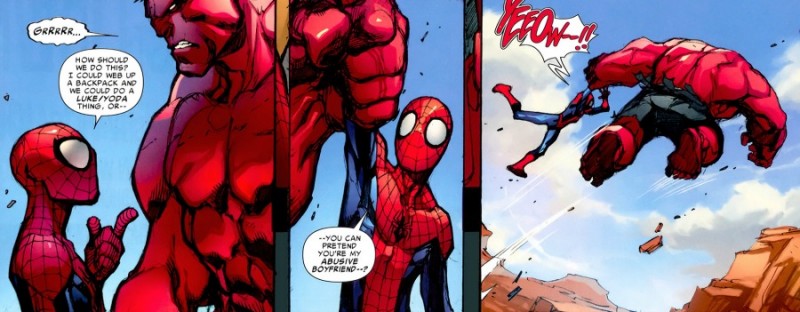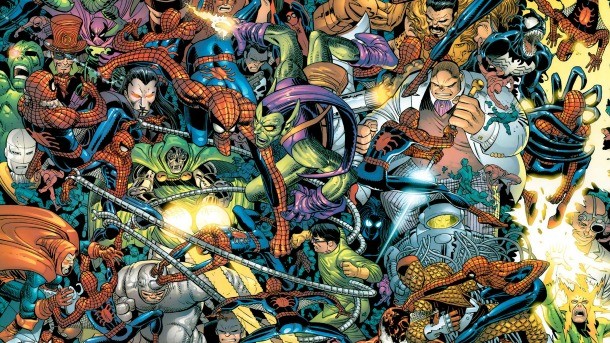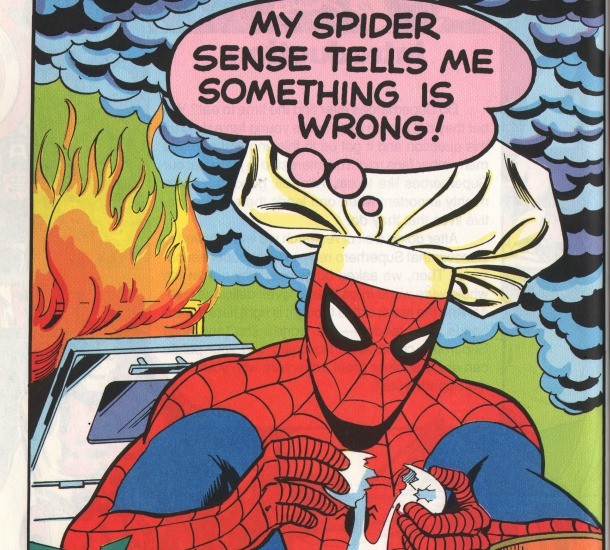Please support Game Informer. Print magazine subscriptions are less than $2 per issue
How Every Game Developer Has Gotten Spider-Man Wrong

If the Batman Arkham games proved anything, it's that comic book-based video games can be highly polished AAA titles in addition to their fan service. Batman: Arkham City could have starred an unlicensed character named Jimmy the Cowled Owl and it still would have been an amazing game. However, those games were great because Rocksteady took DC's fiction and incorporated elements from the Batman mythos into a game that fit his character. Spider-Man has received some good games – notably Neversoft's Spider-Man for the PSone and the movie-licensed Spider-Man 2 for the PS2 era – but none of Spider-Man's games can stack up against the Dark Knight's recent outings. This isn't because the character isn't well suited for video games; this is because video game developers have not been taking full advantage of all the character's strengths.
Here is a quick breakdown of some of the many ways video game developers haven't fully taken advantage of Marvel's Spider-Man:

They Forget About His Alter Ego:
Peter Parker is Spider-Man, but he's not always Spider-Man. Peter is the lovable everyman because he struggles with real world problems. But in truth he has more struggles than anyone else on the planet. He can't pay his electricity bills, his boss is constantly yelling at him, his Aunt May has a frequent membership card at the emergency room, he's always showing up late for dates, and, uh oh, here's another supervillain attack. Marvel Comics discovered long ago that the soap opera of Peter Parker's life was just as interesting as anything that happened to him while he was wearing the mask. Unfortunately, video games have never really introduced gamers to Peter's world. They're only taking advantage of half of a character. I know, that Peter's drama might not seem like a perfect fit for an action game, but titles like Mass Effect and The Walking Dead are practically built around dialogue with interesting characters. Other games such as The Last of Us, BioShock, and Red Dead Redemption were also able to work some interesting character moments into a more action focused experience, so we know it can be done.

They Forget That Spider-Man Is Smart:
Most people know that Spider-Man invented the mechanical web shooters on his wrist, but they might not know that he's a prolific inventor of many things. Peter was the head of his class, he's been published in scientific journals, and in the comics, currently works for a technological research firm. He's invented spider-bots, stealth suits, and spider-tracers that help him track criminals with his spider-sense. The guy even once invented a car the drives up the sides of walls. The point is, he's smart. But according to the games, he's just a schlub who takes pictures of himself for a newspaper. Why can't Spider-Man take his inventive knowledge and use it to upgrade his equipment on the battlefield? Plenty of games have upgrade systems and Spider-Man should be using his intellect to upgrade his tools throughout his journey instead of just unlocking new combos.

They're Not Funny:
Spider-Man is a funny guy; he deals with the troubles of crime fighting by cracking jokes. However, humor is hard to write, and in the games most of the time Spider-Man comes across as an annoying quip machine who occasionally gets so grating that you almost want the bad guys to win. Remember when Blasto and Gex were spouting off random one liners and pop culture references that had little to do with their games? We thought that was funny at the time, because we'd never seen video game characters talk, but that shtick got old, because now talking video game characters are the norm. Series like Portal, South Park: The Stick of Truth, and even Saints Row: The Third have proved that humor can be an integral element to a game's experience. Spider-Man is still stuck in that one-liner era, but maybe it's time he bought a new joke book.

They're Not Taking Proper Advantage Of The Villains:
Spider-Man has one of the most unique and colorful cast of rogues this side of the Dark Knight. Doctor Octopus, Venom, Sandman, The Green Goblin, The Kingpin, Mysterio, and Kraven the Hunter are all fascinating villains with unique backstories and psychological quirks. Unfortunately, almost every Spider-Man game tries to cram this full cast into a single game. Not only does this place awkward constraints around the narrative, but it limits the screen time for each villain. In the past, when superhero games were new, this made sense because no one knew how many Spider-Man games would see the light of day, and everyone wanted to see their favorite character in a game. However, clearly superhero video games aren't going anywhere, so why can't a single game feature a villain who will have the time to appropriately display his madness. Admittedly, even the films are bad at this, but if we can't get down to a single villain, how about a small handful? Think about other video games with strong antagonists – Vaas Montenegro (Far Cry 3), Handsome Jack (Borderlands 2), Sephiroth (Final Fantasy VII), Ganon (The Legend of Zelda) – they all feature one, or maybe two, strong villains. So why do super hero games need a dozen?

They Fail To Property Utilize His Powers:
Spider-Man has a long list of powers; he can climb walls, lift heavy objects with his super strength, sense incoming danger with his spider-sense, and dodge bullets with his spider-like agility (have you ever hit a spider with a bullet? They're very agile). Admittedly, this is probably one of the areas where video games have become closest to the comics, but there is still room for improvement. In most games, Spider-Man is agile and strong – dodging enemy attacks and rebounding around bad guys like a bouncy ball. However, few Spider-Man games have featured the polish of action titles like God of War, Devil May Cry, or even Dark Souls. Some developer needs to look at Spider-Man's agility and strength and design a combat system that showcases both but still feels fun and challenging. Similarly, while many games use Spider-Man's webs in both combat and navigation, they rarely explore his spider-sense in any meaningful way. I know that Beenox's The Amazing Spider-Man tried to incorporate a spider-sense into combat and environmental navigation, and this was a step in the right direction, but Spider-Man's spider-sense could be one of his games' biggest gameplay elements. What if Spider-Man's spider-sense was represented in a gameplay system similar to Max Payne's bullet time or was a rewind mechanic similar to Prince of Persia: the Sands of Time; these may or may not be the right way to implement Spider-Man's spider-sense, but the character's full list of abilities should be reexamined before a developer starts designing gameplay systems, this would ensure that players feel like they are actually controlling Marvel's wall crawler next time they boot up their game console.
Beenox's next installment in the Spider-Man franchise, The Amazing Spider-Man 2, releases next week, so we'll have to wait and see if the company has taken any of these ideas to heart, but we suspect that most True Believers will have to wait a bit longer before we see a Spider-Man game that truly does justice to the hero.










